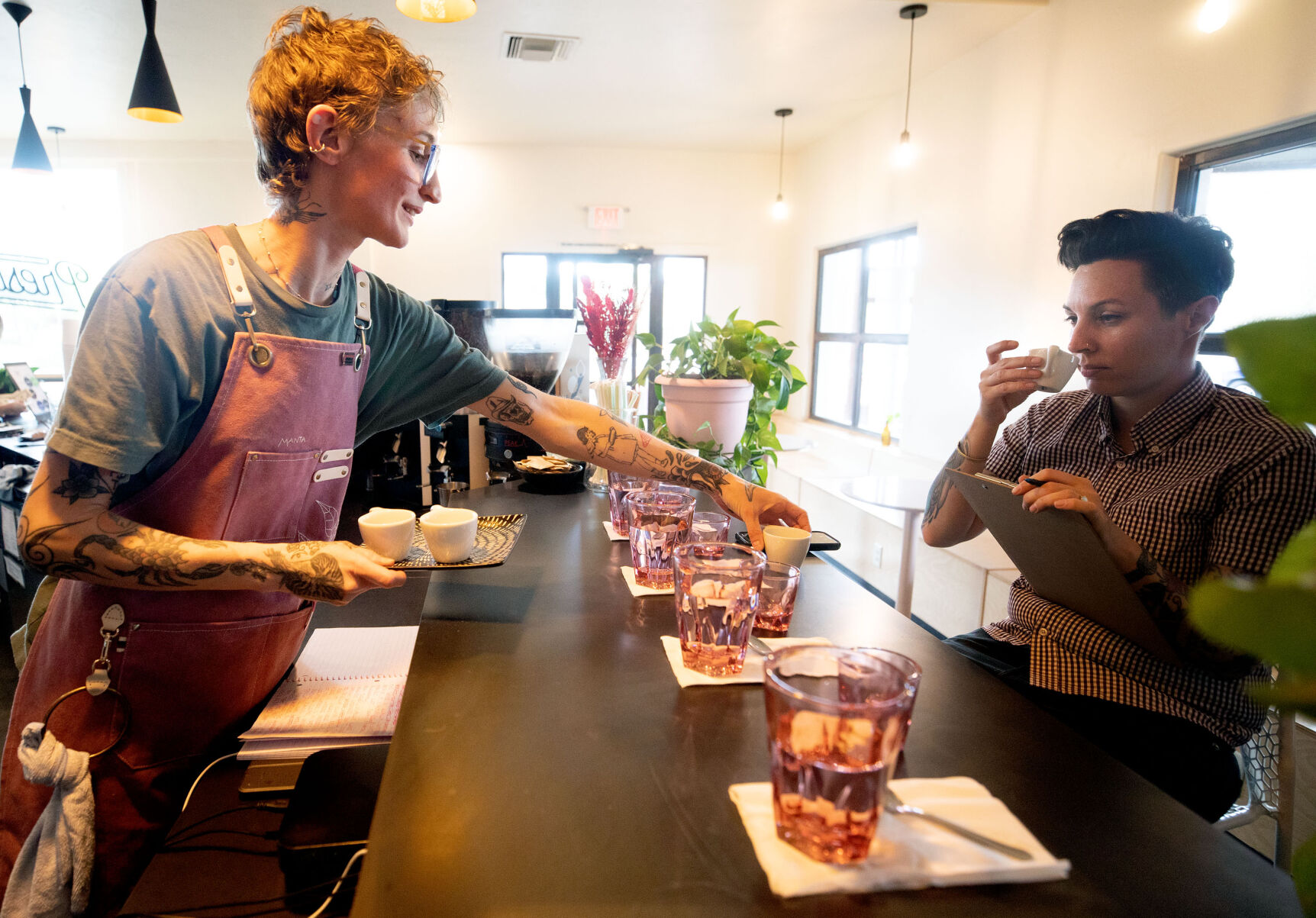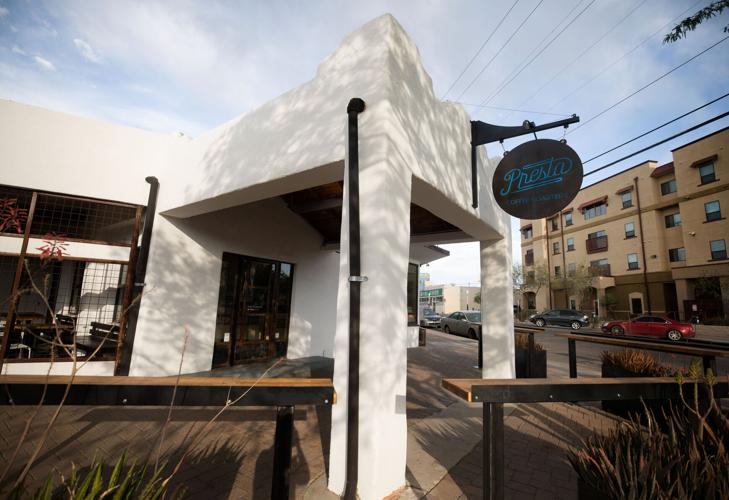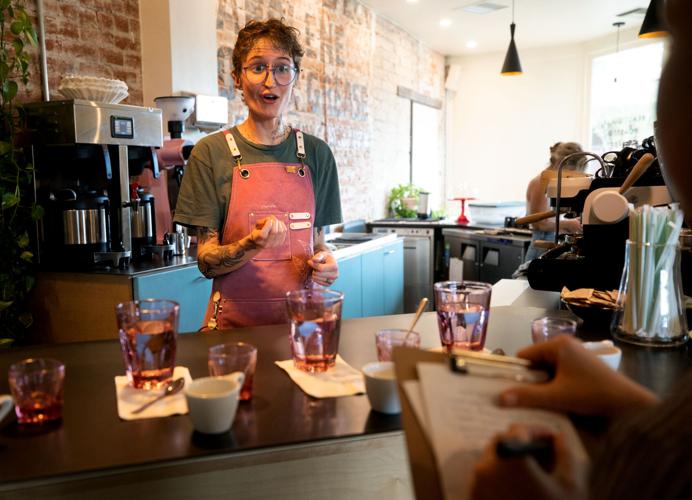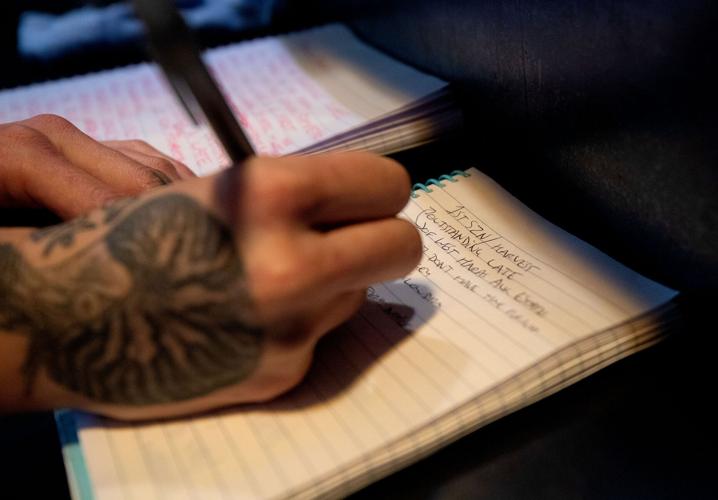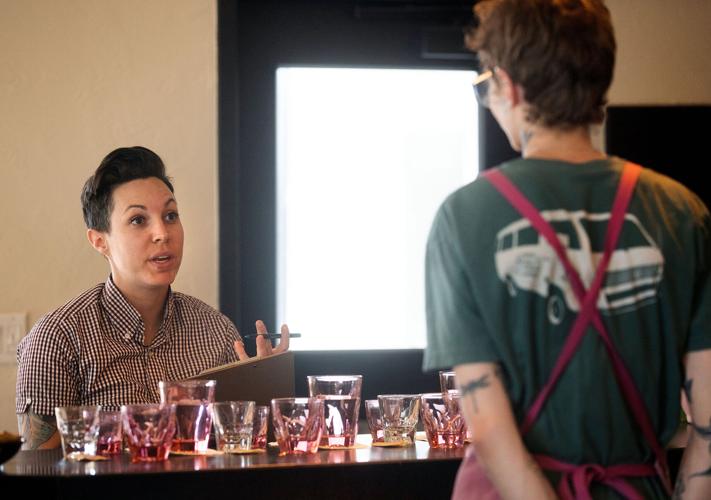Editor's note: We originally published this story on April 17. We're re-sharing this story with good news: Manta placed in the Top 20 🎉
When you go into a fancy coffee shop, the kind that roasts its own beans in house, you might notice the countries like brands printed on the front of the product you can take home: Colombia, Ethiopia, Costa Rica, Yemen. The uniform font belies the beans' geographic diversity: coffee has a terroir like wine. Many of these farmers live in different hemispheres.
Your favorite coffee shop might feel indelibly local: the former gas station on 9th that somehow has gentle lighting all day, the adobe in Barrio Viejo across from the school where you work, the shipping container where you can get a spectacular affogato. Yet that site is a place of convergence for efforts that spanned continents and passed through the hands of both your neighbors — the roaster, the barista— and farmers you’ll surely never meet.

Manta Coffey, left, rehearses his speech with Blair Smith, general manager of Presta Coffee Roasters.
This weekend, one of our neighbors, Manta Coffey of Presta Coffee Roasters, is headed to another place of convergence: the U.S. National Barista Championship, where he will be tasked with telling the story of just one coffee as he serves it to experts in the field.
The 15-minute service is brisk, filled with a tightly-written and rehearsed speech and the preparation of three drinks: an espresso pull, a beverage made with milk and a signature cocktail. The latter is not an espresso martini, but a custom recipe designed to bring out the tasting notes of the specific coffee beans.
The process is impossibly efficient. Manta is an effusive guy, but he reached a new tenor of enthusiasm when describing a tool he saw at the regional competition that turns two tasks into one. He doesn’t want to use a scale in his presentation, so he’s been practicing adjusting the grinder to guarantee a certain output during his presentation.
This is Manta’s first competition season. “I wanted to better myself, but I also wanted to learn more. I wanted to learn more about the processes and harvesting and coffee and all these things,” he said.
“I was the driving force behind it,” he said. “Just to, you know, reach that level of near-perfection as a barista and to know that an amazing cup of coffee can literally change someone’s life, and I could be the one to facilitate that somehow.”
“You’re an advocate,” Blair Smith said, as to finish Manta's thought.

Blair Smith, left, general manager of Presta Coffee Roasters, gives feedback to Manta Coffey, during a coaching session.
Blair is his coach and colleague at Presta. She works there as a roaster and has been competing over the course of many years and several coffeeshops. This year, she spent hours coaching Manta and competed in the roaster's cup event.
“Having gone the better part of a decade, I just have seen new people — but also a lot of the same people — just evolving throughout the years and kind of seeing what they bring year after year,” Blair said. “You know, it's just, it's such a small, small world and everyone is really amazing. And there's just so many fresh ideas out of this that we're just we're just excited to be there.”
“I remember like watching him compete the first time in the preliminary and I literally cried. I was so proud,” Blair said.
Blair works with a coffee producer in Yemen to source the competition beans, and then roasts them in a small batch. The coffee Manta will be using at the competition is especially small, because it’s a rare, high-scoring second harvest.
Presta sold the original Yemen roast after Manta fell one spot short at semifinals to qualify for the national competition. By the time they got the news that someone dropped and he was going to Portland, Oregon, there wasn’t enough left for him to use for the contest.
Then, Blair got a phone call from Mokhtar Alkhanshali, the coffee producer they were working with and the subject of Dave Eggers’ book, "The Monk of Mokha." He revitalized coffee farming in his ancestral Yemen.
“He has one farm and he has three satellite farms (where) he consults. We had one of the satellite farms’ coffee. And basically, I was told, he left Yemen, and he got a call,” Blair said. “One of the workers at the farm, said, ‘There’s some more cherries that just ripened now. We processed them the way you showed us to, would you like to try it?’
“He was shocked,” Blair said. “He didn’t realize there was more. He went back, tried the coffee, and it was phenomenal. So we have this little, second harvest . . . all coffee is scored very precisely and this was a very high scoring coffee. (It) is very interesting and unique that it’s a second harvest and it still turned out amazing.”
“Everything just fell into place,” Manta said.

Presta Coffee Roasters at 501 E. Ninth St. in Tucson.
Manta’s signature drink is going to be tweaked to perfectly align with the new beans. “Just from my conversations with the person who sold me this coffee, I imagine it to be a bit more bubblegummy and candylike, so I want to play it up with those flavors this round,” Blair said.
“Previously, we had a lot of tropical fruit and vinegar elements balanced out by date syrup. We just kind of went crazy with bar tricks,” Blair said.
When they described the signature drink, they spoke in unison, weaving in and out of each other’s sentences — exactly like people who have spent the majority of their free and working time together, thinking critically, practicing and reflecting on a shared goal.
“We did a cold brew that was fat-washed with coconut oil,” Blair said. “We did a clarified milk-” Blair said, before Manta finished the pair’s thought.
“We did a clarified milk with two different kinds of tea and some citrus,” Manta said. “We did a pineapple champagne vinegar. Everything was made from scratch ... An oleo-saccharum garnish ... Pineapple-mango chili glaze ... All those elements came together in less or more quantities to create a balance ... I had never tasted anything like it. It tasted like cola,” Manta said.
Blair continued the thought. “It was like a black forest cake and hibiscus La Croix. Super balanced, really complex,” Blair said.
“It looked beautiful. It was very drinkable. You wanted to have it all the time,” Manta said.
While drinkable, this beverage isn’t necessarily accessible. The kind of coffee brewed at competitions is graded above what we’re able to buy at the grocery store, or even most coffee shops.
“Specialty coffee starts at 80 and goes to 100. Anything lower than 80 would be considered commodity,” Blair said. “(In competition,) we’re dealing with a coffee that is 90 plus. A lot of (Presta’s) coffees sit in the 86-88 range ... There’s a small spread of about 10 points that most roasters work with. Beyond the 90 mark is bursting with intensity in very positive ways.”
“Every time I taste it, I’m filled with gratitude," Manta said. "I just know I'm one of the luckiest people in the world to get to try this. You know what I mean? To just be able to learn from all the people here at Presta.
“You know, I can’t taste on my own, I literally have to have three or four people also to tell me what it tastes like, too, because we can all talk about the notes. Sometimes you don’t even know what a note is until someone says it out loud. Even just the community around trying coffee, being able to find, pick up notes and the balance of the shot together; just everything. You definitely feel like the luckiest person in the world.
“I call it liquid gold. Every time I drink it, I’m like, ‘I’m drinking liquid gold,’ because it just, it really is that amazing,” Manta said.

Manta Coffey writes down notes in preparation for the U.S. National Barista Championship.
Watch Manta compete at Nationals this Friday, April 21, at 1:30 p.m. on the U.S. Coffee Championships website or on their Instagram Live.

Great food and drinks start with great water
Restaurants, breweries and coffee shops know that clean, pure water is crucial. You can get that at home too with Kinetico Quality Water. Kinetico removes more contaminants than any other system. Get up to $500 off a non-electric, high efficiency patented Kinetico system (restrictions apply). Visit KineticoTucson.com.
What does "supported by" mean? Click here to learn more.


